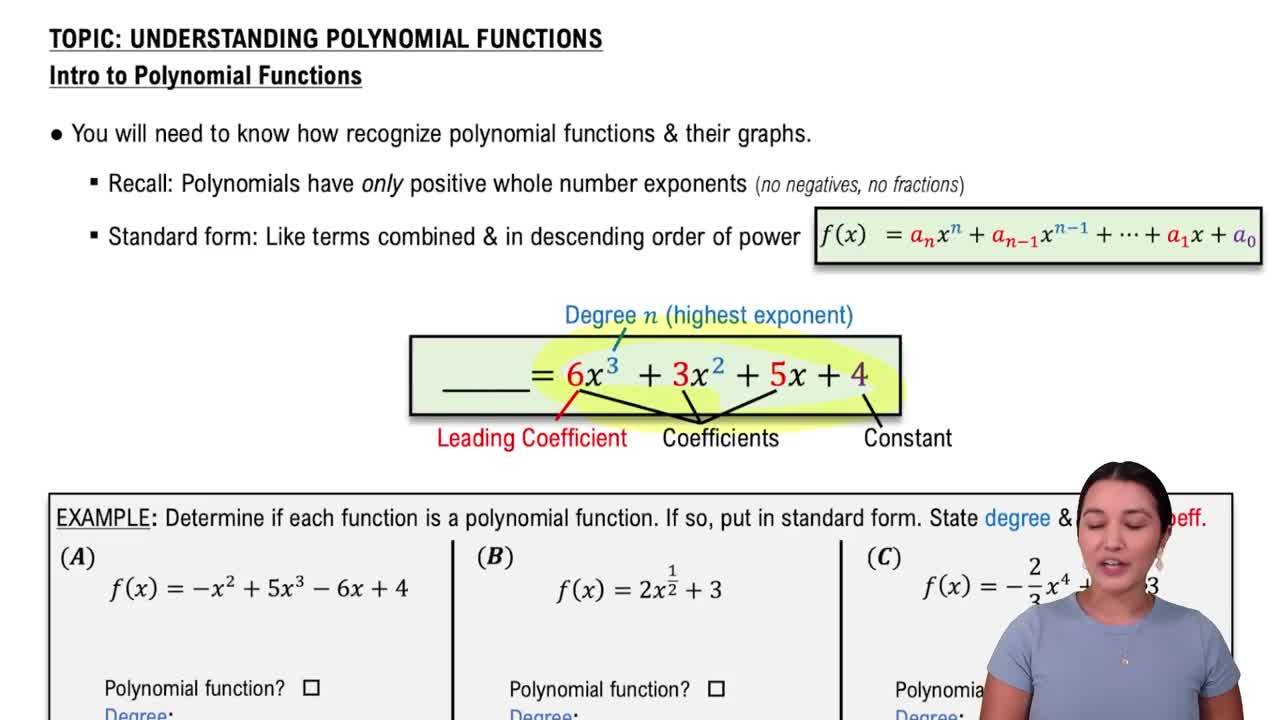Table of contents
- 0. Review of Algebra4h 16m
- 1. Equations & Inequalities3h 18m
- 2. Graphs of Equations43m
- 3. Functions2h 17m
- 4. Polynomial Functions1h 44m
- 5. Rational Functions1h 23m
- 6. Exponential & Logarithmic Functions2h 28m
- 7. Systems of Equations & Matrices4h 6m
- 8. Conic Sections2h 23m
- 9. Sequences, Series, & Induction1h 19m
- 10. Combinatorics & Probability1h 45m
4. Polynomial Functions
Zeros of Polynomial Functions
Problem 73
Textbook Question
Find a polynomial function ƒ(x) of least degree having only real coefficients and zeros as given. Assume multiplicity 1 unless otherwise stated. See Examples 4–6. 2-i and 6-3i
 Verified step by step guidance
Verified step by step guidance1
Identify the given zeros: \(2-i\) and \(6-3i\).
Since the polynomial has real coefficients, the complex conjugates must also be zeros: \(2+i\) and \(6+3i\).
Write the factors corresponding to each zero: \((x - (2-i))\), \((x - (2+i))\), \((x - (6-3i))\), and \((x - (6+3i))\).
Use the difference of squares formula to simplify the product of conjugate pairs: \((x - (2-i))(x - (2+i)) = (x-2)^2 + 1\) and \((x - (6-3i))(x - (6+3i)) = (x-6)^2 + 9\).
Multiply the simplified factors to find the polynomial function \(f(x)\).
Recommended similar problem, with video answer:
 Verified Solution
Verified SolutionThis video solution was recommended by our tutors as helpful for the problem above
Video duration:
8mPlay a video:
Was this helpful?
Key Concepts
Here are the essential concepts you must grasp in order to answer the question correctly.
Polynomial Functions
A polynomial function is a mathematical expression involving a sum of powers in one or more variables multiplied by coefficients. The general form of a polynomial in one variable x is f(x) = a_n*x^n + a_(n-1)*x^(n-1) + ... + a_1*x + a_0, where a_n, a_(n-1), ..., a_0 are constants and n is a non-negative integer. Understanding polynomial functions is essential for constructing and analyzing their properties, such as degree and zeros.
Recommended video:

Introduction to Polynomial Functions
Complex Conjugate Root Theorem
The Complex Conjugate Root Theorem states that if a polynomial has real coefficients, then any non-real complex roots must occur in conjugate pairs. For example, if 2-i is a root, then its conjugate 2+i must also be a root. This theorem is crucial for determining all roots of a polynomial when given some complex roots, ensuring that the polynomial remains with real coefficients.
Recommended video:

Complex Conjugates
Finding Polynomial from Roots
To construct a polynomial function from its roots, one can use the fact that if r is a root, then (x - r) is a factor of the polynomial. For multiple roots, the factor is raised to the power of the root's multiplicity. By multiplying the factors corresponding to all given roots, including complex conjugates, one can derive the polynomial function of least degree that satisfies the conditions of the problem.
Recommended video:

Imaginary Roots with the Square Root Property
Related Videos
Related Practice


